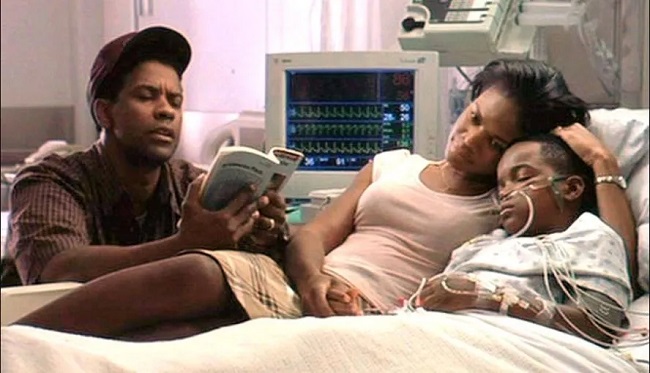American drama thriller The sympathetic yet compelling plot of John Q kept the audience on the edge of their seats. This 2002 film, directed by Nick Cassavetes, came out. The film’s plot centres on a man who learns that his son need a heart transplant.
But his insurance provider won’t pay for the high expense of this major procedure. He holds the medical staff and patients in the emergency room hostage in an effort to persuade the hospital to perform the surgery. Only until his kid is added to the list of organ donors will he release the hostages and ensure their safety.

But Many Also Questioned Whether John Q Was Based On A Real Event.
The crowd enjoyed the film, but many also questioned whether John Q was based on a real event. Henry pulled out a gun that was concealed under a towel and held the doctor hostage in order to demand that the hospital take immediate action to care for his son’s health.
When the police arrived, they shot Henry to death. Henry’s son escaped the house with his family without suffering any injuries. The audience felt sympathy for the characters in the film because it showed how many Americans lack health insurance and how those who did have it faced high medical costs.
Read Also:
- Are Jake And Logan Paul Twins
- Cubans Denounce Misery In Biggest Protests In Decades
- She Hates Biden. Her Neighbors Hate
There Was No John Q In Actuality.
It’s kind of a yes and no question as to whether John Q. was based on a factual story. In other words, the movie’s creators did not base it on a true story. There was no John Q in actuality.
However, you can learn that a relatively identical incident took place in Toronto in 1998 if you choose to listen to the film’s commentary track with director Nick Cassavetes and writer James Kearnes.
Before the SWAT team advisers for the movie told Nick and James the tale, neither of them were aware of it. His weapon turned out to be an unloaded pellet gun, as was later found. His youngster was not hurt, and they were allowed to leave the hospital together.
“John Q”: A Synopsis
Before we dive into the question of whether “John Q” is based on a true story, let’s briefly outline the plot of the movie:
- The Protagonist: John Quincy Archibald, portrayed by Denzel Washington, is a hardworking factory employee and a loving father to his young son, Michael.
- A Desperate Situation: The film’s central conflict arises when Michael collapses during a baseball game due to a heart condition. John Q discovers that his insurance won’t cover the heart transplant needed to save his son’s life.
- Drastic Measures: Faced with the looming tragedy, John Q takes matters into his own hands. He holds the emergency room staff hostage at gunpoint, demanding that his son be placed on the transplant list.
- Moral Dilemmas: As the hostage situation unfolds, “John Q” explores profound ethical questions about healthcare, insurance, and the lengths a desperate parent will go to save their child.
The Inspiration Behind “John Q”
To determine whether “John Q” is based on a true story, we must examine its origins:
- Original Screenplay: “John Q” is not directly based on a true story or a specific real-life incident. Instead, it is an original screenplay written by James Kearns.
- Inspiration from Real Issues: While “John Q” is a fictional narrative, it draws inspiration from real-world issues surrounding healthcare access and the challenges faced by individuals without adequate insurance.
- Social Commentary: The film serves as a social commentary on the American healthcare system, raising awareness about the struggles that many individuals and families encounter when trying to access life-saving medical treatments.
- Dramatic License: Although the core premise of a desperate father taking hostages to secure medical treatment is fictional, it is a dramatic device used to explore the broader themes of healthcare inequity and the moral dilemmas faced by families in dire circumstances.
Addressing Healthcare Disparities
“John Q” may not be based on a true story, but it shines a spotlight on critical issues within the healthcare system:
- Healthcare Access: The film highlights the difficulties faced by individuals who lack adequate health insurance or financial resources to cover necessary medical procedures.
- Medical Debt: “John Q” underscores the potential financial ruin that can result from mounting medical bills, forcing individuals into impossible choices.
- Moral Quandaries: The movie challenges viewers to consider the moral dilemmas that arise when a person’s actions are driven by desperation and the desire to save a loved one’s life.
- Advocacy and Awareness: “John Q” has inspired advocacy and discussions about healthcare reform and the need for more accessible and affordable healthcare options.
Legacy and Impact
“John Q” may not be based on a true story, but its enduring impact on audiences and discussions about healthcare issues cannot be denied:
- Emotional Resonance: The film’s emotional depth and powerful performances by Denzel Washington and the cast continue to resonate with viewers, sparking empathy and compassion.
- Call for Change: “John Q” has motivated individuals and organizations to advocate for healthcare reform, with many highlighting the need for a more equitable healthcare system.
- Discussion and Reflection: The movie encourages audiences to reflect on the moral and ethical implications of healthcare disparities and the lengths people may go to when faced with a life-and-death situation.
Read Also:
- And Just Like That… Tragically Hip
- Was Charming Saltbox Hamptons. Now Its
- Ncaas Dan Gavitt Apologizes To Womens Basketball Teams For …
Final Words
Another incident occurred in 2015 when Oakland County resident Brian Randolph, then age 23, robbed a bank to pay for the cancer treatment of his daughter.
The stories and how they are presented clearly differ in several important ways, but there is no denying the overwhelming desire to protect one’s child as a significant parallel. It’s simple to think that “John Q” was based on a genuine story, especially since he is viewed as the nice person and the physicians and insurance company as the villains. However, this is not the case.
